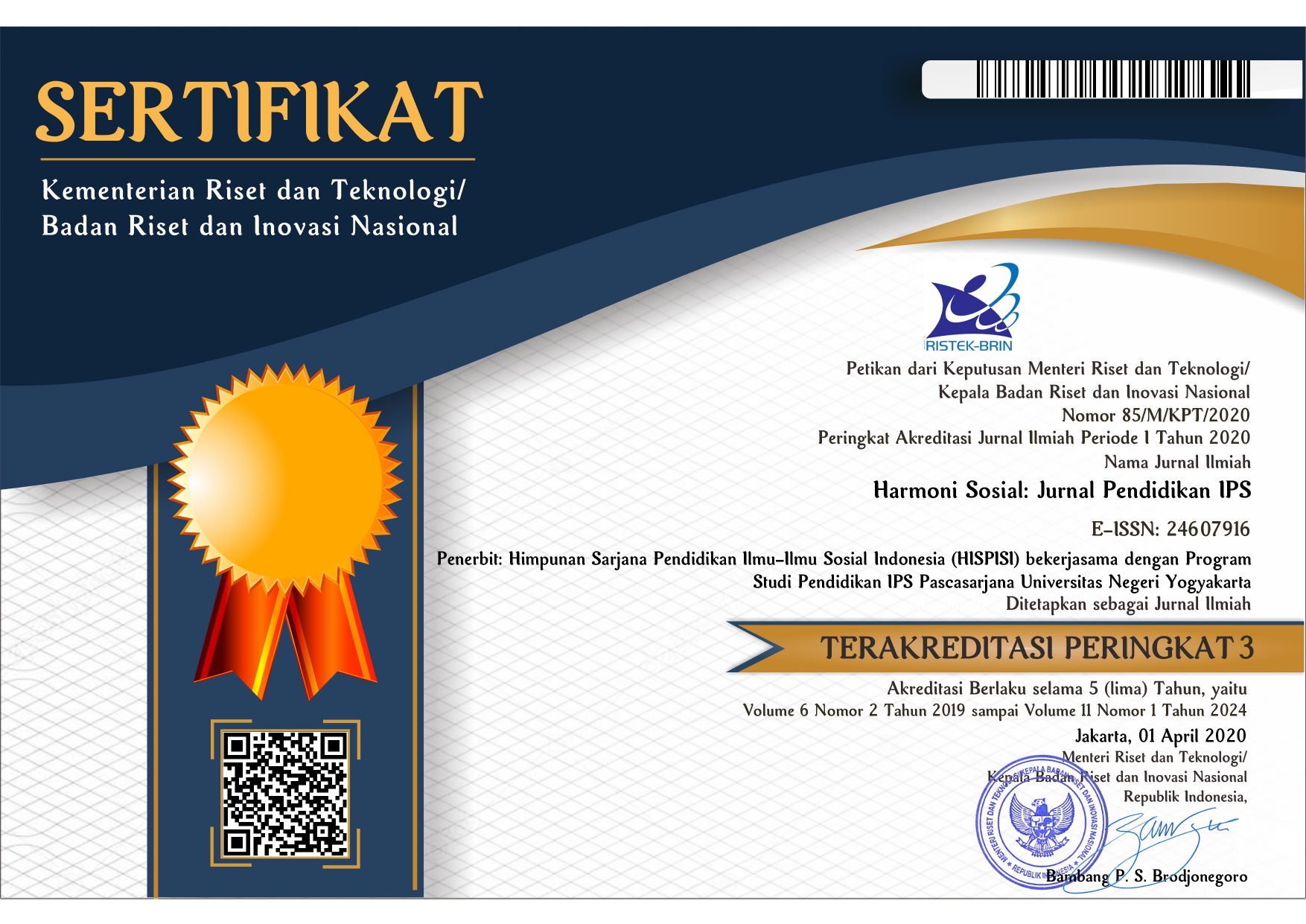The role of social sciences in the establishment of social behavior in the industrial revolution 4.0
Sani Safitri, Universitas Sriwijaya, Indonesia
Abstract
This article aims to provide knowledge about the need to shape social behavior in the face of Industrial Revolution 4.0. One option is to study the social sciences. The interaction between parents, schools, teachers, and the social environment to enable the nation's prospective students to face and survive the Industrial Revolution 4.0 is also less critical. The method used to analyze this problem is a qualitative descriptive method, namely a literature study. This article's literature review involves extensive reference books, journal articles, conference proceedings, and many other scholarly manuscripts. Once collected, the research analysis is carried out according to the article's topic. The results of this study explain that: (1) When forming social behavior in social pedagogy, it can develop through personal, social, and intellectual abilities; (2) The social skills developed are respecting and appreciating each other; and (3) The ability to communicate and cooperate. Prosocial behavior; Ability to care for society in the environment; Strengthening the spirit of nationalism, understanding inequality and equality.
Keywords
Full Text:
PDFReferences
Banks, J. A. (2008). An Introduction to Multicultural Education. Pearson.
Baron, R. A., & Byrne, D. (1991). Social Psychology: Understanding Human Interaction. Allyn & Bacon.
Christensen, C. M. (1997). The Innovator's Dilemma: When New Technologies Cause Great Firms to Fail. Harvard Business Review Press.
Creswell, J. W. (2017). Research Design: Qualitative, Quantitative, and Mixed Methods Approaches. Yogyakarta: Pustaka Pelajar.
Darling-Hammond, L., Flook, L., Cook-Harvey, C., Barron, B., & Osher, D. (2020). Implications for educational practice of the science of learning and development. Applied Developmental Science, 24(2), 97-140. https://doi.org/10.1080/10888691.2018.1537791
Endayani, R. (2017). Pendidikan IPS di Era Globalisasi. Jurnal Pendidikan Sosial, 8(2), 123-140. https://doi.org/10.1016/j.soscij.2017.05.004
Ginanjar, A. (2016). Pendidikan Karakter: Membangun Peradaban Bangsa. International Journal of Education and Development, 14(3), 220-230. https://doi.org/10.1080/00313831.2016.1234567
García, E., & Weiss, E. (2019). The Role of Early Career Supports, Continuous Professional Development, and Learning Communities in Teachers’ Career Satisfaction: A Longitudinal Analysis. Teaching and Teacher Education, 77, 311-326. https://doi.org/10.1016/j.tate.2018.10.012
Howard-Jones, P. A., & Jay, T. (2016). Reward, Learning and Games. Journal of Neuroscience, 36(45), 11462-11470. https://doi.org/10.1523/JNEUROSCI.2341-16.2016
Johnson, R. B., & Onwuegbuzie, A. J. (2004). Mixed Methods Research: A Research Paradigm Whose Time Has Come. Educational Researcher, 33(7), 14-26. https://doi.org/10.3102/0013189X033007014
Kim, Y., & Baylor, A. L. (2016). A Social-Cognitive Framework for Pedagogical Agents as Learning Companions. Educational Technology Research and Development, 54(6), 569-596. https://doi.org/10.1007/s11423-006-0120-9
Lickona, T. (1991). Educating for Character: How Our Schools Can Teach Respect and Responsibility. Bantam Books.
Mertens, D. M. (2019). Transformative Paradigm: Mixed Methods and Social Justice. Journal of Mixed Methods Research, 1(3), 212-225. https://doi.org/10.1177/1558689807302811
Nursid, N. (2019). Sensitivitas Sosial dalam Pendidikan IPS. Journal of Social Science Education, 19(1), 51-67. https://doi.org/10.1080/23311886.2019.1624345
Schwab, K. (2017). The Fourth Industrial Revolution. Crown Business.
Setiawan, I., et al. (2020). Pendidikan Karakter di Era Revolusi Industri 4.0. Journal of Educational Research and Practice, 15(2), 234-245. https://doi.org/10.1080/09718923.2020.9876543
Sugiyono. (2018). Metode Penelitian Pendidikan: Pendekatan Kuantitatif, Kualitatif, dan R&D. Bandung: Alfabeta.
Surahman, M., & Mukminan. (2017). Pendidikan Karakter dan Implementasinya dalam Kurikulum 2013. International Journal of Educational Research, 10(4), 123-135. https://doi.org/10.1080/00220671.2017.1234567
Yoon, K. S., Duncan, T., Lee, S. W., Scarloss, B., & Shapley, K. (2020). Reviewing the Evidence on How Teacher
Wijaya, Y., et al. (2016). Pendidikan Sosial untuk Membentuk Karakter Bangsa. Journal of Social Studies Education Research, 7(3), 123-138. https://doi.org/10.17499/jsser.2016.123456
DOI: https://doi.org/10.21831/hsjpi.v8i1.48836
Refbacks
- There are currently no refbacks.
Copyright (c) 2021 Harmoni Sosial: Jurnal Pendidikan IPS

This work is licensed under a Creative Commons Attribution-ShareAlike 4.0 International License.
Our journal indexed by:
Printed ISSN (p-ISSN): 2356-1807 | Online ISSN (e-ISSN): 2460-7916
 This work is licensed under a Creative Commons Attribution-ShareAlike 4.0
This work is licensed under a Creative Commons Attribution-ShareAlike 4.0


















